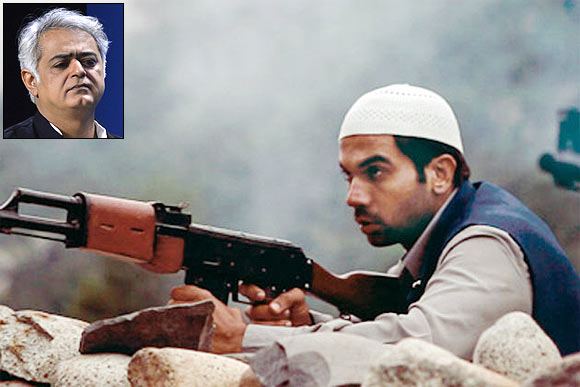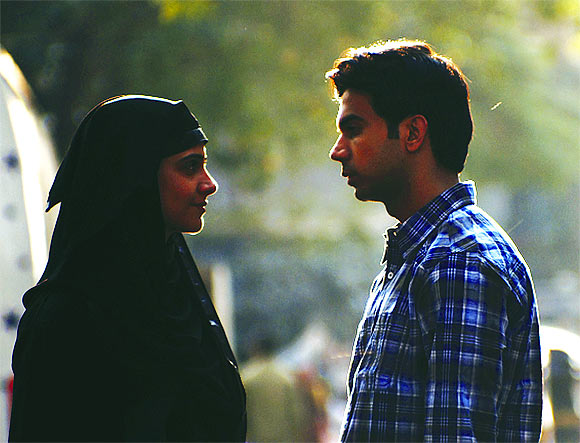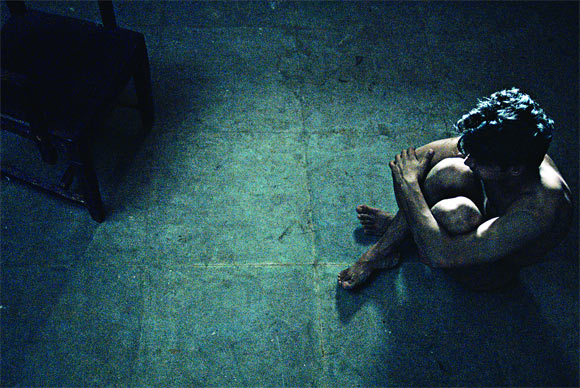
Few minutes into Hansal Mehta's stirring Shahid -- an emotional film that challenges even the most cynical and hard hearted audiences -- and you wonder about the director and how he came to make this film about the slain human rights activist and lawyer Shahid Azmi.
Shahid, which made a powerful impact at the Toronto International Film Festival, 'marries elements of a political thriller, personal biography and romantic tragedy while being a courtroom drama at its core,' said festival director Cameron Bailey.
Mehta who describes himself as a foodie -- he produced Khana Khazana that made chef Sanjiv Kapoor a household name in India -- says he is a humanist, stupid romantic, politically incorrect, socially inept, and largely cynical.
Mehta talks to Rukmani Sah about his film.
How was the response at Toronto?
At the first screening, the audience was mixed, South Asians and Canadians. But the second screening had mostly non-South Asians.
Most of the questions were about Shahid, his life and his struggles, and there were a few questions about the craft. And that was quite fine with me. In fact, I welcomed the opportunity to speak about this remarkable person.

How did this project start?
It came from having no idea for my next film. Over three years ago, I directed Woodstock Villa, but I was not at all happy with my work. For some time I seriously wondered whether I should direct another film at all. But during this hiatus, I had been reading a lot and also paying attention to what was happening around me.
For quite some time, there has been a polarization in Mumbai but now I find that even in rural areas, there is communal polarization. There was polarization based on caste and creed. The reason I have been paying more attention to such issues has something to do with my wife who runs the largest non-governmental organisation for women in the most backward areas of Rajasthan.
It was during these soul searching months, I came across a news item about the murder of a man who had gone from being a jihadi to a human rights lawyer and fighter and had turned his life around in a remarkable way.
The real life story, I felt, was even more compelling than any powerful novel or an imaginary screenplay.
I wanted a producer who would understand my vision and commitment.
Sunil Bohra, whose family has been in the movies for three generations, is one such producer who likes films, which are very different from the run-of-the-mill. He has produced films like Gangs of Wasseypur and his commitment made all the difference.
After I told him in about five minutes what Shahid was about, he got very enthusiastic. He spoke with Anurag Kashyap (director, Gangs of Wasseypur), who thought it was the right time to make a film like Shahid. Anurag also served as producer on this film and he is guiding us about the release in a few months.
In my earlier films, I have tried to respond to the world around me by showing concerns of class conflict, and the fight for injustice Jayate (1998) and Dil Pe Mat Le Yaar!! (2000). But I also feel that after Chhal (2002), I lost some of my focus. There were a lot of personal problems, too.
When I read about Shahid Azmi, the anger in me began rising, and I felt the urge to do something I had not done in a long time by making a simple film based on a powerful story. I also began to think of the filmmakers who have influenced me.
Which are the filmmakers you admire the most?
I attended a film festival in Mumbai many years ago and I stumbled on the Polish filmmaker Krzysztof Kieslowski's Blue. I saw Red and White after that. Kieslowski changed my life and because of his films, I was inspired to watch works by international filmmakers.
I have also admired the work of Vishal Bhardwaj (one of the first persons to nudge me into films), Anurag Kashyap and Dibakar Banerjee. Among many things, I also watched how they fight for their independence and make films on small budgets.
I had a very small budget -- smaller than the so-called art films -- for Shahid, but the big commitment from everyone involved made this film possible.
My son Jai, who has been trained by Anurag, was my chief (and only) assistant. He also became a punching bag and a crisis manager. For him, this project was not only a challenging film, but also a means of coming closer to me.

What is your biggest concern while making a film?
I am not a rebel without a cause. I want people to see my films. I feel that unless audiences buy the ticket and see the films in a theater, our efforts do not really succeed.
Film festivals are important and international film festivals like TIFF take our films to a wider audience. But I also want our audience in India to see and discuss a film like Shahid.
I believe there are many filmmakers in India who are making even better films than the ones in the City to City program at TIFF, and their films also need to be seen widely, at least in big cities.
My film is simple, moving and timely. It can be understood by urban as well as rural audiences, if it is distributed carefully.
You have made Shahid without stars. Would you consider making a film with a star?
My one big ambition in recent years is to make a film with Ranbir Kapoor. I believe he is more talented than his grandfather Raj Kapoor and father Rishi Kapoor.
I feel Ranbir is the most talented actors among the Kapoors, too. I thought his father was an excellent actor, but this young man is even better, and he is able to do justice to the challenging roles he has been taking up.